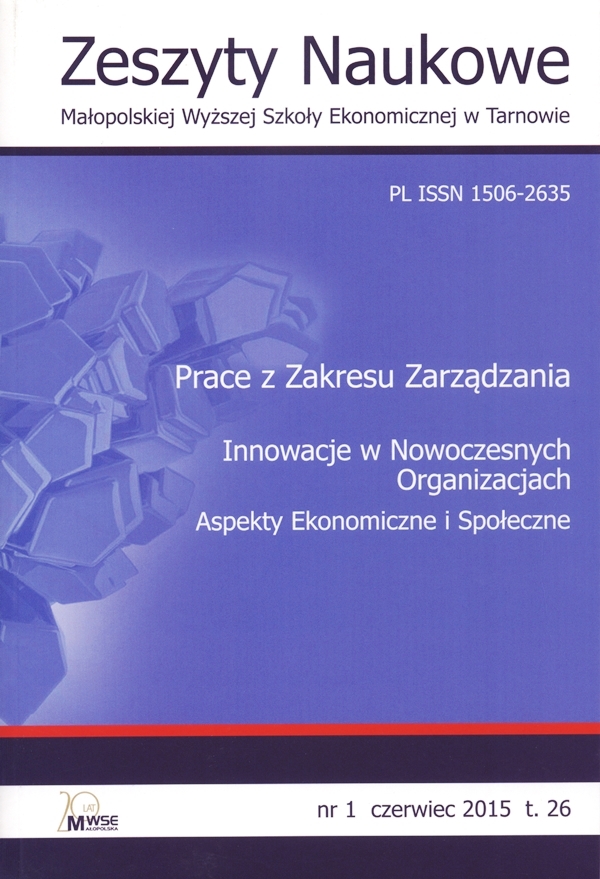Abstract
The paper proposes a general formula for developing a knowledge management system. Knowledge management focuses on the creation and use of intellectual resources as well as practical skills—a company’s intangible assets. These assets relate to various scientific areas and empirical applications, and they constitute a significant source of competitive advantage. Knowledge is a structured set of information—a universal or specialised collection of factual material—which is used in the processes of corporate functioning and development. Knowledge is the effect of the learning process; it may result from buy-sell transactions (intellectual property, inventions and copy rights), or it constitutes a field of management. The paper presents: the interpretations of the concepts of knowledge capital and knowledge management systems, a multi-aspect knowledge management system model, a concept for development based on restructuring and innovation, and the criteria for assessing corporate development. The above issues are part of the methodology of corporate development management. Its major objective is to stimulate scientific, technological, economic and organizational advancement.
References
Anthony, S.D., Johnson, M.W., Sinfield, J.V., Altman, E.J. (2010). Przez innowację do wzrostu: jak wprowadzić innowację przełomową. Warszawa: Oficyna a Wolters Kluwer business. ISBN 978-83-7526-708-2.
View in Google Scholar
Białoń, L. (red.) (2010). Zarządzanie działalnością innowacyjną. Warszawa: Placet. ISBN 978-83-7488-153-1.
View in Google Scholar
Davenport, T.H. (2007). Zarządzanie pracownikami wiedzy. Kraków: Wolters Kluwer Polska. ISBN 978-83-7526-030-4.
View in Google Scholar
Dolińska, M. (2010). Innowacje w gospodarce opartej na wiedzy. Warszawa: PWE. ISBN 978-83-208-1877-2.
View in Google Scholar
Jasiński, A.H. (2014). Innowacyjność w gospodarce Polski. Warszawa: Wydawnictwo Naukowe Wydziału Zarządzania Uniwersytetu Warszawskiego. ISBN 978-83-63962-43-2.
View in Google Scholar
Kowalczyk, A., Nogalski, B. (2007). Zarządzanie wiedzą. Koncepcje i narzędzia. Warszawa: Difin. ISBN 978-83-7251-694-7.
View in Google Scholar
Mikuła, B. (2006). Organizacje oparte na wiedzy. Kraków: Wydawnictwo Akademii Ekonomicznej w Krakowie. ISBN 83-7252-302-9.
View in Google Scholar
Perechuda, K. (red.) (2005). Zarzadzanie wiedzą w przedsiębiorstwie. Warszawa: Wydawnictwo Naukowe PWN. ISBN 83-01-14492-0.
View in Google Scholar
Pomykalski, A. (2001). Zarządzanie innowacjami. Warszawa–Łódź: Wydawnictwo Naukowe PWN. ISBN 83-01-13480-1.
View in Google Scholar
Skyrme, D.J. (1999). Knowledge Networking. Creating the Collaborative Enterprises. Oxford: Butterworth-Heinemann. ISBN 0-7506-3976-8.
View in Google Scholar
Stabryła, A. (2005). Categorization as an instrument in managing company development capacity. Argumenta Oeconomica Cracoviensia, 3.
View in Google Scholar
Stabryła, A. (red.) (2009). Doskonalenie struktur organizacyjnych przedsiębiorstw w gospodarce opartej na wiedzy. Warszawa: C.H. Beck. ISBN 978-83-255-0237-9.
View in Google Scholar
Stabryła, A. (red.) (2012). The Opportunities for Constraints to Organizational Development in the Information Society. Kraków: Mfiles.pl. ISBN 978-83-935104-0-5.
View in Google Scholar
Zahay, D., Griffin, A. (2004). Customer learning processes, strategy selection and performance in business-to-business service firms. Decision Sciences, 35(2).
View in Google Scholar
© Copyright by Małopolska School of Economics in Tarnów. The articles are available under the Creative Commons Attribution NonCommercial-NoDerivatives 4.0 International License


